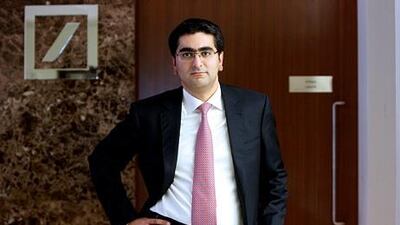Ibrahim Qasim has Islamic finance in his blood. His father was a pioneer of the industry, and he has been working in it all his career, for the past two years as the head of Islamic finance structuring at Deutsche Bank (DB) in Dubai.
So last week, when Sheikh Mohammed bin Rashid, Vice President of the UAE and Ruler of Dubai, set out his vision of the emirate becoming a global hub for Islamic finance and economy, Mr Qasim was pleased, but not entirely surprised.
"The initiative is a very positive one. It will solidify Dubai and the UAE's current standing as an important Islamic finance hub," he says.
But he believes the emirate already has an advantage within the Islamic economy, and that his bank is ready to help and support the emirate's policymakers in their ambitions.
"Deutsche Bank has dedicated Islamic finance specialists across the globe, from London to Jakarta, but the main hub has always been Dubai. Dubai and the UAE have always had an edge when it came to structuring and executing Islamic finance transactions.
"We benefited from an existing regulatory platform, the Dubai International Financial Centre, which attracted the necessary talents and skills, an experienced and mature Islamic finance industry with roots that date back to the 1970s - Dubai Islamic Bank was the first commercial Islamic bank set up in the world back then - and availability and access to some of the Islamic world's most regarded and experienced Sharia scholars," he says.
Dubai also had more practical logistical advantages when it came to DB's choice of the emirate as the global centre for its Islamic business.
Mr Qasim says: "Location was also an important factor for us, the geographic proximity (and related logistical efficiencies) to the world's natural users of Islamic financial services in countries like Saudi Arabia, Bahrain, Qatar, Kuwait and the Far East made it easy for us to facilitate transactions from our hub in Dubai.
"We found our work here easily customised for the needs of those countries.
"All those factors gave us and other participants in the industry (including international law firms) the necessary impetus to structure, develop and execute innovative Sharia-compliant products out of the Dubai hub since the early 2000s.
"So all our work expanded from Dubai across the GCC and to the Far East. In our view, Dubai was already acknowledged as an established centre for excellence in Islamic finance."
So far, so good. The organic growth of DB's business from Dubai across the world should reinforce the confidence of Dubai's leaders that the road to being an Islamic hub for finance and economy is a realistic one that has already been trodden, in a corporate sense, by one of the world's leading global banks.
But some experts have pointed to a number of practical challenges on the way as Dubai strives to realise its Islamic ambitions.
The key elements of an Islamic system would require a unified Sharia board to put together the sets of rules to govern the industry; an arbitration system to resolve disputes; and a code of conduct or regulatory framework to oversee all. Recognition of qualified Islamic scholars is another issue that needs to be resolved.
It is still early days in the grand Islamic strategy for Dubai, and Mr Qasim agrees there are still challenges for Dubai to overcome: "Having a well-defined, acceptable and investor-friendly arbitration process for Sharia-compliant transactions is an excellent idea. At present, investors in or creditors to Islamic instruments tend to take more comfort when the choice of law and places for arbitration is set as either London or New York.
"Dubai can certainly build on the current DIFC arbitration frameworks which already apply internationally accepted arbitration standards which can be fine-tuned to accommodate Sharia requirements," he says.
Some financial professionals in Dubai also voice concerns that the focus on building an Islamic economy and financial system will distract attention from the emirate's ongoing (and so far successful) strategy of being the premier marketplace for conventional finance in the Arabian Gulf region.
Mr Qasim does not agree: "In our view, an Islamic hub operating in Dubai would not be in competition with the conventional financial services industry, it would be an alternative, complementing the existing industry," he says.
Following Sheikh Mohammed's announcement last week, there is sure to be a surge of interest, among the UAE's indigenous Islamic industry, as well as the international banks that have developed Sharia-compliant units. Experts predict a field day for lawyers and consultants.
Mr Qasim says: "We're always ready to deploy more resources when the business demand is there. We already have a significant number of specialised resources committed to supporting this important and growing sector.
"DB would, of course, be pleased to assist the Government on this initiative and play its part in further developing and supporting this sector if approached."
As, no doubt, would the rest of the Dubai financial community.

